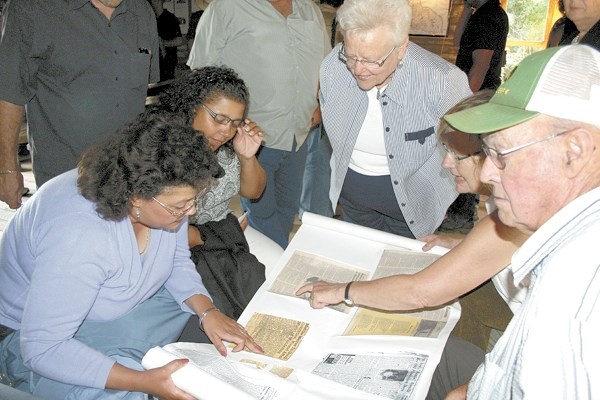Most of the time the Shiloh Baptist Church and Cemetery north of Maidstone sit as silent reminders of time long ago, the only physical remnants of what was once a busy community of African American settlers. Aug. 14 the tiny log building was once again a hub of activity as descendants of black pioneers and their guests celebrated the 100th anniversary of the settlement.
The names signed in the guest book were familiar, many of the surnames the same as those cast in bronze on the cairn remembering those buried in the cemetery and in other old records. The atmosphere was like a family reunion as people gathered from the district, Alberta, British Columbia and as far away as Los Angeles, Calif.
The wind blew and the rain threatened, appeared and disappeared, but it didn't dampen the enthusiasm for the past and the stories of those who risked so much to make a better life for their children and the future generations who were standing on the very spot where faith was shared and life was lived. There were as many as four generations of some families in attendance with children making their first trip to the area and seniors returning to the land where they were born.
Inside the church a map showing where the homesteads were originally located was hung on a wall, photographs, newspaper clippings and historical panels were also carefully displayed so everyone could gain greater understanding of the stories being kept alive with the preservation of the little log building.
Cindy Burke and Debbie Pagee were delighted and touched to read newspaper articles and see a copy of their great grandmother Mattie Mayes' marriage certificate and listen to stories about the matriarch of their family tree. There were smiles and warm greetings as people renewed acquaintances and met new friends and family members. They were happy to see each other and the building so carefully preserved, restored and protected over the past decade.
The celebration continued with a banquet and speeches at nearby Milleton Hall. Leander Lane, president of the Shiloh Baptist Church and Cemetery Restoration Society and one of the event's organizers shared a bit of history about the settlement and stories he had heard during his childhood and as he became more involved in the project.
Carol LaFayette-Boyd of the Saskatchewan African Canadian Heritage Museum Inc. was on hand to describe the work of her organization and to recognize the 'Centennial Celebration of People of African Descent'. She brought certificates and plaques to recognize individuals for their contribution to the Shiloh Baptist Church restoration and preservation. Lane presented the awards and read the words inscribed.
Keith Schwartz was presented with a certificate to recognize "his involvement and commitment to the preservation of the church".
Danica Lorer received a certificate to recognize "her enthusiasm for history, her many news articles have contributed to continued public awareness of the Shiloh Baptist Church and Cemetery."
Arlene Frolick was recognized with a certificate for her "initiative to recreate the burial ledger at the Shiloh Baptist Church Cemetery."
Iris Nicholson was presented with a plaque to recognize her lengthy commitment to the church. "For donation of labour in the 1970s, for her written words in the 1980s, and for her financial contribution in 2004."
Lane was presented with a plaque by LaFayette-Boyd to recognize his work, dedication and leadership over the years. A plaque was also presented to hang in the church to remind visitors of the contributions of volunteers.
Frolick took some time to explain the process she went through during her time as president of the Saskatchewan Genealogical Society a decade ago when she researched the names of the people buried in Shiloh Cemetery. She spoke about the importance of using census information and distributed documents and information about the families of the settlers to descendants in attendance at the event.
"I'm very gratified to get the younger generation out to this event, they're interested in their history, that was my goal for today and I think we've been successful," said Lane after the program.
His sister Leaetta Lane was emotional about the event. "I often get strength from thinking about Julius Caesar Lane because at a time when we think about retirement, he was 59 years old when he came to Canada, he picked up everything and embarked on a whole new adventure. I think about the hardship he endured to make my life easier and when I'm going through a hard time my hardships pale in comparison. I'm proud to be a descendant of black pioneers and proud to be a Canadian," she said.
Vaughn Lane, an 11-year-old, fifth generation descendant of pioneer Julius Caesar Lane, is happy to live in this time and hopes to share the stories and a trip to the Shiloh Church with his own children someday. "My great, great grandfather brought his whole family here and they didn't even have cars so it took him even longer," he said.
Laneesa Lane is Julius Caesar Lane's great, great, great granddaughter and at 10-years-old she is already very interested in her heritage. She helped her grandfather clean the church in July and counts the anniversary celebration as one of the highlights of her summer vacation. "It was a good day, it was a big day. I learned a lot more today. It is important to me that the church is still here as a reminder of our ancestors who used it and of our history, it is a connection to our community." she said. "The stories are important so I can learn at an early age and as I grow older I'll learn more and more and I'll really get it," she added.
The story of the Shiloh People is unique in Saskatchewan and the 100th anniversary was a time to listen, learn and share, to celebrate and move into the next century with gratitude for the risks taken by ancestors and hope to keep the memories alive.




